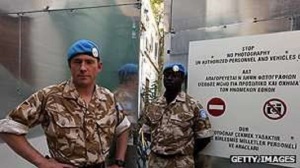
Kurt Lykke Lindved Ph.D
Culture and Development – UN
Lecturer and Writer
Honored Dutch Counsel
Former CEO in EAC
Entertainer and Event Management
By legend the birthplace of the ancient Greek goddess of love Aphrodite, Cyprus’s modern history has, in contrast, been dominated by enmity between its Greek and Turkish inhabitants.
Cyprus has been divided since 1974 when Turkey invaded the north in response to a military coup on the island which was backed by the Athens government.
In 1974 the island was effectively partitioned with the northern third inhabited by Turkish Cypriots and the southern two-thirds by Greek Cypriots.
The UN peacekeeping forces estimate that 165,000 Greek Cypriots fled or were expelled from the north, and 45,000 Turkish Cypriots from the south, although the parties to the conflict say the figures are higher.
conflict say the figures are higher.
The UN Buffer Zone, commonly called the “Green Line”, dividing the two parts from Morphou through Nicosia to Famagusta, is patrolled by United Nations troops.
The UN drew up the Green Line as a ceasefire demarcation line in 1963 after intervening to end communal tension. It became impassable after the Turkish invasion of 1974, except for designated crossing points.
North declares independence
In 1983 the Turkish-held area declared itself the Turkish Republic of Northern Cyprus. The status of Northern Cyprus as a separate entity is recognised only by Turkey, which keeps around 30,000 troops in the north of the island.
 The prospect of EU enlargement concentrated minds in the search for a settlement. UN-sponsored negotiations continued throughout 2002 and a peace plan was tabled. Soon afterwards the EU invited Cyprus to become a member.
The prospect of EU enlargement concentrated minds in the search for a settlement. UN-sponsored negotiations continued throughout 2002 and a peace plan was tabled. Soon afterwards the EU invited Cyprus to become a member.
But hopes that the island could join united were dashed when leaders of the Turkish and Greek communities failed to agree to the UN plan by the March 2003 deadline.
In the months that followed travel restrictions were eased, enabling people to cross the border for the first time in nearly 30 years. But hopes of larger progress continued to be disappointed.
Hopes on hold
A revised UN reunification plan was put to both communities in April 2004. Turkish Cypriots endorsed the plan but Greek Cypriots overwhelmingly rejected it, and so the island remained divided as it joined the EU in May.
Hopes rose again briefly after the election of leftwing Turkish Cypriot leader Mehmet Ali Talat, who agreed to talks on reunification with the new Communist president of Cyprus, Demetris Christophas, in 2008. The victory of nationalists at parliamentary and later presidential elections in the north over the following two years brought talks to an end.
After independence from Britain in 1960, Cyprus successfully diversified its largely agrarian economy into one based on services – including a large tourism sector – and light manufacturing. More recently it has also developed into an important financial hub, especially for investors from Russia and Eastern Europe.
But in 2012, Cyprus’ economy was badly hit by its extensive exposure to recession-hit economy of Greece, and the country was forced to seek emergency help from international lenders.
Russian investors were particularly affected by the collapse of the Cyprus economy, but despite this Russia continues to have significant financial interests in the island.
And when the EU imposed sanctions on Russia in response to its role in the Ukraine crisis in 2014-15, Cyprus was one of a handful of EU members to voice serious reservations over the move.





